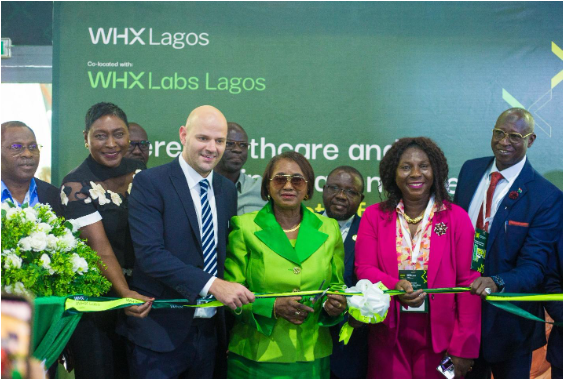Ojulari: Setting The Stage For Energy Sector Growth With Stakeholders’ Engagements

The recent wave of high-level engagements by the new Group Chief Executive Officer of the Nigerian National Petroleum Company Limited, Mr Bashir Bayo Ojulari, marks a significant turning point in the trajectory of Nigeria’s energy sector.
President Bola Tinubu had on April 4 this year announced the reconstitution of the NNPC team, which saw the replacement of the NNPCL board chairman, Chief Pius Akinyelure, and all other board members appointed in November 2023.
The reconstituted board includes six non-executive directors representing the country’s geopolitical zones: Bello Rabiu (North West), Yusuf Usman (North East), Babs Omotowa (North Central), Austin Avuru (South-South), David Ige (South West), and Henry Obih (South East). Additionally, Mrs Lydia Shehu Jafiya and Aminu Said Ahmed will represent the Federal Ministry of Finance and the Ministry of Petroleum Resources, respectively.
President Tinubu, in exercising the powers granted under Section 59, subsection 2 of the Petroleum Industry Act, 2021, noted that restructuring the board is essential for enhancing operational efficiency, investor confidence, boosting local content, driving economic growth, and advancing gas commercialisation and diversification.
The new board had been tasked with conducting a strategic portfolio review of NNPC-operated and joint venture assets to ensure alignment with value maximisation objectives.
The move comes less than two years after oil sector reforms implemented by the Tinubu administration attracted $17bn in new investments under the leadership of the immediate past Group CEO of the NNPC, Mallam Mele Kyari.
Ojulari had, upon resumption last month, unveiled an ambitious five-year growth and development agenda that will see NNPC attracting $30bn in investments by 2027 and $60bn by 2030.
He had, during a town hall meeting with members of staff of NNPC, declared that the national oil company, under his stewardship, is targeting raising crude oil production to over two million barrels per day, which it hopes to sustain through 2027 and attain three million barrels per day by 2030.
He also unveiled plans to expand refining output to 200,000 barrels per day by 2027 and 500,000 barrels per day by 2030; grow gas production to 10 billion cubic feet per day by 2027 and 12 billion cubic feet by 2030; and deepen energy access and affordability for all Nigerians.
“We stand at the gateway of a new era—one that demands courage, professionalism, and a relentless drive for excellence.
“The task before us is great, yet the opportunity to redefine Nigeria’s energy future is even greater. Now is the time to turn our transformation promise into performance.
“To achieve these targets, the company will be focusing on reconfiguring its business structure for agility and value creation, conducting independent value assessments to inform data-driven decisions and enforcing a robust performance management framework.
“The company will build transparent, value-aligned partnerships with all stakeholders and, most critically, take control of its narrative,” he had said.
The targets are not just metrics but indicators of hope, jobs, industrial growth, and energy security for millions of Nigerians.
In just five weeks after resumption, Ojulari has demonstrated a refreshing leadership style rooted in openness, collaboration, and strategic vision, offering a glimmer of optimism in the oil and gas sector.
From receiving oil majors like ExxonMobil, Chevron, Shell, and ENI to forging deeper ties with African financial institutions such as the Africa Finance Corporation and Afreximbank, Ojulari’s approach is notably inclusive and proactive.
These meetings were not mere formalities; they were substantive discussions on how to harness synergies to advance Nigeria’s energy security, deepen investment, and foster national prosperity.
Reimagining Energy Leadership Through Engagement
The tone and tempo of Ojulari’s leadership so far suggest a man who understands the urgency of Nigeria’s energy challenges. His decision to meet with a cross-section of local and international stakeholders—including Dangote Refinery, Nigeria LNG, Sahara Energy, and the African Petroleum Producers’ Organisation—signals a shift towards practical collaboration over rhetoric.
More importantly, these engagements point to a strategic orientation that values innovation, investment facilitation, and value creation. With global energy dynamics shifting and Nigeria’s hydrocarbon assets in need of rapid monetisation and modernisation, the GCEO’s open-door policy is expected to unlock more investments for the oil and gas industry.
Focus On Gas, Financing, & Industrial Partnerships
Particularly commendable is Ojulari’s emphasis on Nigeria’s vast gas potential, evident in his consultations with the Minister of State for Petroleum Resources (Gas), Ekperikpe Ekpo, and his dialogue with Nigeria LNG and Chevron on accelerating gas commercialisation. At a time when the world is transitioning towards cleaner energy, positioning gas as a transitional fuel is both strategic and necessary.
The NNPC Ltd has committed to building numerous CNG stations, including 12 mother stations and mini-LNG plants, to boost gas supply and accessibility.
Recall that in February this year, NNPC commenced the deployment of five new Compressed Natural Gas (CNG) cascades at designated stations in Abuja with the aim of boosting access.
Last October, the NNPC signed a partnership with Shell, TotalEnergies, and Agip to complete a historic agreement to supply gas to a $3.3bn methanol plant being developed by Brass Fertiliser & Petrochemical Company Limited in Bayelsa State.
The move also aligns with the federal government’s efforts to expand CNG access across the country.
The NNPC is also collaborating with partners like NIPCO Gas Limited to launch CNG stations and promote CNG adoption.
Africa is currently grappling with the dual challenges of decarbonisation and energy poverty.
To address these, Nigeria has implemented two significant policy shifts to support its decarbonisation efforts.
Recall that Africa adopted 2060 as the feasible time for achieving its net-zero target.
Nigeria is a signatory to the Oil & Gas Decarbonisation Charter (OGDC), and the country is focused on achieving gas flare-out by 2030 through the utilisation of gas for automotive and power generation.
Nigeria has substantial gas reserves, amounting to 209 trillion cubic feet (tcf). However, accessing capital to fund gas projects has been challenging, as the primary source for raising such funds is the balance sheets of International Oil Companies (IOCs), which are predominantly focused on gas exports.
Ojulari’s engagement with financial institutions like AFC and Afreximbank reflects an understanding that Nigeria’s energy aspirations cannot be fulfilled without sustainable financing structures.
By courting these institutions early in his tenure, Ojulari is laying the groundwork for transformative infrastructure and investment partnerships.
Championing Healthy Competition, National Prosperity
The visit by the President of Dangote Refinery and Petrochemicals Company, Alhaji Aliko Dangote, to NNPC Towers and the resulting message of “cooperation over competition” is another powerful signal. Rather than fostering rivalries, Ojulari appears committed to a model where NNPC serves as a facilitator of national development, partnering with local industry giants to unlock value across the energy chain.
This is critical, especially as Dangote Refinery nears full operational capacity, promising to alter the domestic refining landscape.
Both the NNPC and Dangote Refinery have pledged to deepen collaboration aimed at ensuring Nigeria’s energy security and advancing shared prosperity for Nigerians.
During the visit, Dangote pledged to collaborate with the new NNPC management to ensure energy security for Nigeria.
“There is no competition between us. We are not here to compete with NNPC Ltd. NNPC is part and parcel of our business, and we are also part of NNPC. This is an era of cooperation between the two organisations.” Dangote added.
While congratulating the GCEO and the Senior Management Team on their “well-deserved appointments”, Dangote acknowledged the enormity of the responsibility ahead, noting that the GCEO is shouldering a monumental task, which he expressed confidence that, with the capable hands at his disposal in NNPC, the task is surmountable.
Expressing the company’s readiness to build a legacy of national prosperity through innovation and shared purpose, Ojulari said NNPC will sustain its collaboration with the Dangote Group, especially where there is a commercial advantage for Nigeria.
Strengthening Institutional Partnerships & Knowledge Exchange
The courtesy visit by the National Institute for Policy and Strategic Studies (NIPSS) and the proposed collaboration on sustainable development is a sign that NNPC under Ojulari is not just a commercial entity but a policy-minded institution. This bodes well for aligning energy development with national planning and intellectual discourse.
While it is still early days, Ojulari’s tenure has begun with clarity of purpose and visible results. His focus on partnership, transparency, and strategic engagement is what Nigeria desperately needs in an era where energy plays a central role in economic revival.
Of course, challenges remain—from crude theft and infrastructure decay to regulatory hurdles and global market volatility. But with Ojulari’s pragmatic and consultative approach, there is renewed hope that NNPC Ltd can indeed become the commercial powerhouse it was restructured to be.
The message to stakeholders is clear: a new era has begun—one where collaboration, not confrontation, will define the path to energy security and national prosperity.
Ojulari: Setting The Stage For Energy Sector Growth With Stakeholders’ Engagements is first published on The Whistler Newspaper



